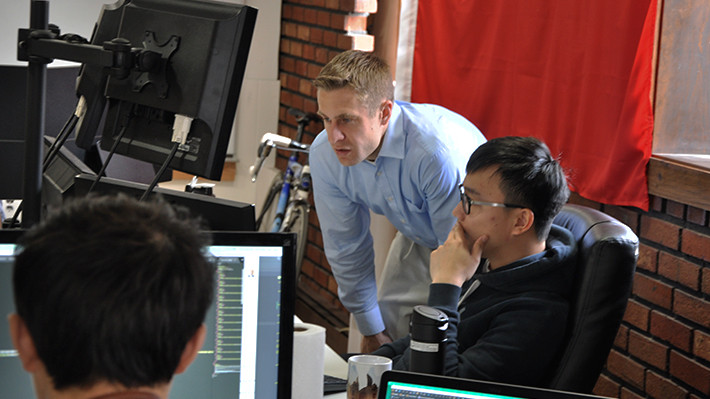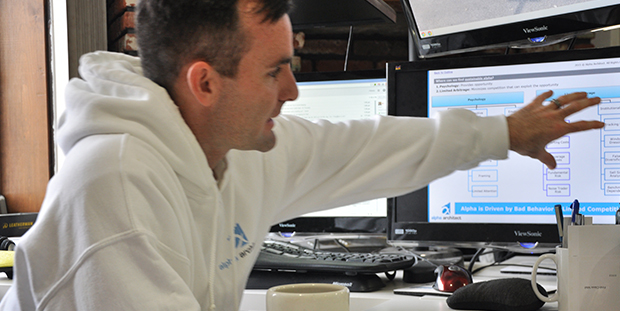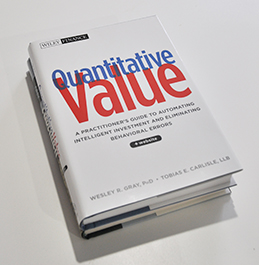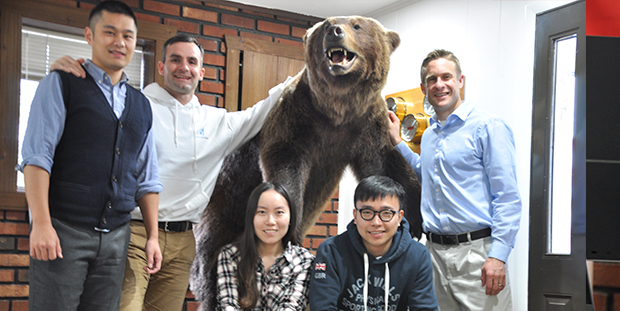
Asset Management With Character
Alpha Architect is a unique option for value-oriented investors.
Imagine a typical asset management firm. You’re probably picturing modern furniture, track lighting and expensive works of art.
Despite having a name that might connote such fancy associations, Wes Gray’s asset management startup, Alpha Architect, embodies a spirit that is pretty much the antithesis of the typical fashionable, urban investment advisor. The atmosphere you’ll find here borders on rustic. He carved a portion of his spacious home in Broomall, Pa., into a dedicated workspace for himself and seven of his employees. Complete with exposed brick and wood paneling, flags and memorabilia from his stint in the armed services, and even taxidermy (a large grizzly bear stands in the corner watching over the team while they work, reminding them of the ever-present threat of a bear market), this is obviously an unconventional place to receive personalized investment advice.
Gray prefers it this way. It captures the essence of his company, his philosophy, himself.

Wes Gray explains Alpha Architect's theory.
A former Marine who took time off during his PhD program at the University of Chicago to train the Iraqi Army as a Marine Corps. adviser, Gray landed a position at LeBow in 2010 as an assistant professor of finance. He spent four years teaching classes and researching theories related to quantitative investing and behavioral finance. He started Alpha Architect as a side project, and when it grew to the point where it demanded more attention, he left his full-time job at LeBow. He still teaches graduate-level finance classes here, as an adjunct.
Gray’s primary piece of advice to current finance students, who are faced with a quickly changing industry: Learn how to program.
Walking through the door at Alpha Architect is the first step in earning what Gray, with a smile, calls, “your honorary PhD in behavioral finance.” His passion and excitement for his company is palpable; he explains Alpha’s philosophy, method and products with an obvious and infectious enthusiasm.
The company’s theory, in a nutshell: First, discard any dogmatic beliefs that the markets are always efficient. Research going back decades has suggested that there are many inconsistencies with this view that cannot be explained away. Next, seek to understand the role of human psychology in financial markets and how these might account for such inconsistencies. For example, take our tendency to over-extrapolate short-term trends (a stock has bad news and dips too far, as people expect more bad news and envision it continuing its downward trend). Now, use quantitative methods to create algorithms that automatically apply behavioral finance theories to identify cases where overreaction has occurred, in order to uncover the most-underpriced, high-quality value stocks, and remove the effects of pernicious human bias from the process.
Forget Bear and Bull Markets: Alpha Architect Seeks Investors who can Endure Short-term Pain to Reap Long-term Rewards.

Employees Jack Vogel, PhD, and Yang Xu of Alpha Architect asset management
Alpha Architect caters to a specific type of investor: One who is very focused on value, who is naturally curious and wants to be educated about his or her investments, and one who can withstand the inevitable short-term “pain,” so to speak, to seek long-term goals. Gray says their fees are roughly about half of what a typical fund would charge for similar active strategy.
The company is 4 years old, but already has 50 high-net-worth clients, including a high-profile multi-billion-dollar family based in New York City. In late October, the firm established two ETFs under the Value Shares name (QVAL, composed of U.S. stocks, and IVAL, which is made up of international stocks) which currently hold a combined $50 million. At the firm level, including the ETFs, Alpha’s investments total approximately $200 million.

Quantitative Value – A Practitioner’s Guide to Automating Intelligent Investment and Eliminating Behavioral Errors
It’s a tight operation with a relentless focus on costs and every operational detail optimized through technology. His employees are all self-described “quant geeks,” and almost everyone knows how to program and conduct research. For example, the CFO, Jack Vogel, is not your typical accounting guru. He has a PhD in finance, leads research projects, and writes detailed research reports for the company’s blog. And there’s not much about the workspace that anyone would call “fancy,” except perhaps the high quality of the research and the great atmosphere.
“The Baby Boomers nowadays may still like a little handshake action at the bank, but younger people are more likely to use robo-advisors and other automated solutions. And all the evidence in the world suggests that efficient and affordable robots are better at advising clients than overpriced bankers.”
Gray employs several hand-picked LeBow alums. Tian Yao, a quantitative research associate who previously served as a research assistant to Gray at LeBow, received her MS in finance last June. Tao Wang and Yang Xu, both managing members, also each received MS in finance degrees; and CFO Vogel is a recent LeBow PhD graduate. Drexel is deeply embedded in the firm’s DNA.
Gray’s primary piece of advice to current finance students, who are faced with a quickly changing industry: Learn how to program. “Financial services will not be the same 10 years from now. The Baby Boomers nowadays may still like a little handshake action at the bank, but younger people are more likely to use robo-advisors and other automated solutions. And all the evidence in the world suggests that efficient and affordable robots are better at advising clients than overpriced bankers.”
Alpha’s current goal is to grow its ETF by $2 million a month, and continue to grow its personalized services for high-net-worth individuals and family offices. Asked if he thinks Alpha will outgrow their austere office setup in the near future, Gray pauses, before shaking his head. “I think we could add a couple of zeros to our asset base right here, where we are.”

Gray's team of hand-picked LeBow alums including Tian Yao, Tao Wang, Yang Xu and Jack Vogel along with the office grizzly bear.
